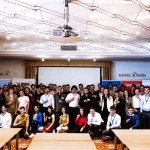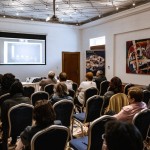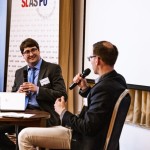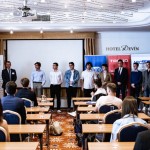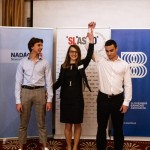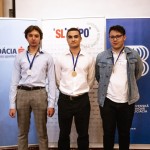The pandemic, war and heavily criticized graduation exams have not deterred young people interested in economics from taking part in this year’s Economics Olympiad. Interest in economic topics grows every year, which was evident in the fifth year of the Olympiad, which attracted a record number of students from all over Slovakia.
The fifth-year finals of the Economics Olympiad took place on Tuesday, 3rd May 2022 at the Hotel Devín in Bratislava, where we got to know the names of the three best young economists from all over Slovakia. The Economics Olympiad helps young people develop their economic skills and deepen their interest in it, while also providing a valuable feedback to teachers on their students’ knowledge. The Economics Olympiad project in Slovakia is organized by INESS – Institute of Economic and Social Studies in cooperation with the Czech Institute of Economic Education (INEV).
A record number of 11,300 students participated in Economics Olympiad this year, which is an increase of almost a third compared to last year. 540 competitors made it to the regional rounds, which took place online as last year. So finally, in the finals we met in person with 51 students from all over Slovakia, who have proven the best insight in economics and analytical thinking.
Click here to view the placings of the finalists after the written exam.
The first part of the national finals was a 60-minute test focused on current economic issues that affect the everyday life of Slovak people. The high school competitors analyzed how a price ceiling affects food supply and demand, argued how sanctions will affect the economies of Russia and the EU, and also calculated how rising real estate prices affect home insurance premiums and potential compensatory damages. The top ten students went through an oral examination in which drew a question and then presented their knowledge and argued for their opinions in front of an expert jury. The members of the jury were experts from academia, private and non-profit sector: Robert Chovanculiak (INESS), Richard Kališ (Slovak Economic Society), Štefan Máj (Slovenská sporiteľňa Foundation), Richard Pánek (EY Slovakia) and Martin Šuster (Section of the Recovery Plan, Government Office of the Slovak Republic).
Monika Budzák, Director of the Economics Olympiad in Slovakia: “Every year I am surprised by how many economic myths and nonsense young people believe in. For example, many students in the regional round believed that closed borders and state ownership would bring greater consumer welfare and economic stability. But today’s national round filled me with optimism as we read and heard economic arguments, based on data and reasonable conclusions, which I would have expected to hear from students at university.”
Within the finals, a program of lectures and discussions was prepared for students and teachers. This year, a lecture for the accompanying teachers was prepared by INESS analyst Radovan Ďurana entitled “Social system from left to right”. The functioning of the social system in Slovakia, its financing and setup were discussed.
The “war” against the pandemic was followed by a real one. Rising prices, disrupted trade relations, logistical failures, refugees. What will this mean for the Slovak, European and global economy? This question was the main topic of the afternoon program, which consisted of a panel discussion entitled “Economics and financial markets in the times of war”. Martin Vlachynský from INESS and Tibor Lörincz, an economic analyst in Tatra banka, took part in the discussion. They discussed the current situation in the financial sector, changes in interest rates and monetary policy strategies. They also touched upon the role of expectations in economic development or current inflation.
After the oral exam and the final evaluation, the jury determined the final placings of all ten super-finalists of the Economics Olympiad. The third place belongs to Matej Sova from the Gymnasium on Teplická street in Bratislava, the second place belongs to David Guľaš from LEAF Academy in Bratislava and the absolute winner of the fifth year of the Economics Olympiad is Martin Kips from the Gymnasium on Grösslingova street in Bratislava.
The organizers, project partners and members of the expert committee congratulated and awarded prizes to the competitors. Thanks to the sponsors, the most successful three finalists can enjoy valuable prizes such as an e-book reader, a mobile phone and a laptop.
Click here to view the placings of the top 10 finalists after the oral exam.
David Guľaš, Monika Budzák from INESS and Martin Kips and the final ceremony.
“I wasn’t expecting this, I guess it’s a mixture of the fact that I have prepared and that the questions were right up my street, both in the written or in the oral part of the exam. I think it was very well organized, and I was more stressed during the results announcement than I was during the exam itself, but of course it was nothing major, you would feel comfortable here all day long and I’m glad it turned out like this. I definitely recommend the Economics Olympiad to everyone to take part in, because you have nothing to lose, and you may find something you enjoy or you are good at, and even if not, the questions and the exams are practically oriented, they are related to current economic problems, so it is something that everyone can gain some knowledge from,” said the winner of this year’s Economics Olympiad, Martin Kips.
“Participating in the Economics Olympiad has given me bigger insight, helped me to formulate economic arguments better and motivated me to continue in my economic interest,” said one of the competitors in an anonymous questionnaire.
The lack of economic and financial literacy has been heavily discussed in recent years. The Economics Olympiad helps to highlight economic problems and encourages students to start thinking about solutions at a young age. It also motivates schools and teachers to teach economics more. This is the only way to cultivate critical thinking and raise a generation that does not believe in populist shortcuts but understands the market mechanism and the creation of prosperity.
For support of the Economics Olympiad in the school year 2021/2022 we would like to thank: the Slovak Banking Association, Slovak Insurance Association, Slovenská sporiteľňa Foundation, Tatra banka Foundation, Martinus, EY Slovakia, ABCedu, SPP Foundation, Nexteria, Zones, Trend, Slovak Economic Association, Institute of Economic Education (INEV), University of Economics in Bratislava, Faculty of Management of Comenius University, Faculty of Social Sciences of University of St. Cyril and Methodius in Trnava, Faculty of Social and Economic Relations of Alexander Dubček University in Trenčín, Faculty of Economics and Management of Slovak University of Agriculture in Nitra, Faculty of Economics of Matej Bel University in Banská Bystrica, Faculty of Operation and Economics of Transport and Communications of University of Žilina, Faculty of Management, Economics and Trade of University of Prešov and Faculty of Economics of Pavol Jozef Šafárik University in Košice.
Translated from Slovak by Nikola Ácsová
Continue exploring:
There Will (Not) Be Any More Health Professionals: Slovak Perspective




